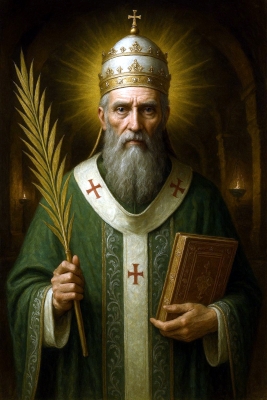Lives of the Saints
Our Models and Protectors
Spiritual Bouquet:
October 26

Saint Evaristus
Pope and martyr
(† 108)
Saint Evaristus succeeded Saint Anacletus on the throne of Saint Peter, elected during the second general persecution, under the reign of Domitian. That emperor no doubt did not know that the Christian pontificate was being perpetuated in the shadows of the catacombs. The text of the Liber Pontificalis, says of the new pope:
Evaristus, born in Greece of a Jewish father named Juda, originally from the city of Bethlehem, reigned for thirteen years, six months and two days, under the reigns of Domitian, Nerva and Trajan, from the Consulate of Valens and Veter (96) until that of Gallus and Bradua (108). This pontiff divided among the priests the titles of the city of Rome. By a constitution he established seven deacons who were to assist the bishop and serve as authentic witnesses for him. During the three ordinations which he conducted in the month of December, he promoted six priests, two deacons and five bishops, destined for various churches. Evaristus received the crown of martyrdom. He was buried near the body of Blessed Peter in the Vatican, on the sixth day of the Calends of November (October 25, 108). The episcopal throne remained vacant for nineteen days.
The Bollandists explain two passages of this text as follows: Saint Anacletus had ordained twenty-five priests for the city of Rome; Saint Evaristus completed this institution by settling the boundaries of each of these titles, and filling the vacancies which probably occurred during the persecution of Diocletian. As for the decree by which he ordains that seven deacons make up the cortege of the bishop, we find in the first epistle of Saint Anacletus a text which helps us to grasp and better perceive the discipline of the early Church. There existed amid the diverse elements which composed it in its first years, proud minds, envious souls, ambitious hearts which could not bear the yoke of obedience, and who by their revolts and incessant detraction fatigued the patience of the Apostles. The deacons were to be the Pope's guards against their ill-intentioned projects.
It was at the same time as Saint Ignatius, the illustrious bishop of Antioch, that Pope Saint Evaristus gave his life by martyrdom. The acts of his martyrdom are lost, but we perceive that the same faith, heroism and devotion united the churches of the East and of the West. He is often represented with a sword because he was decapitated, or with a crib, because it is believed that he was born in Bethlehem, from which his father migrated.
Reflection: The disciples of the apostles, by assiduous meditation on heavenly things, were so rapt by foreshadowings of the life to come, that they seemed no longer to inhabit this world. If Christians esteem and set their hearts on earthly goods and lose sight of eternity, they are no longer animated by the spirit of the primitive Saints and have become children of this world, slaves to its vanities and to their own irregular passions. If we do not correct this disorder of our heart and conform our interior life, with its decisions and propensities, to the spirit of Christ, we cannot be heirs to His promises.
Les Petits Bollandistes: Vies des Saints, by Msgr. Paul Guérin (Bloud et Barral: Paris, 1882), Vol. 12; Little Pictorial Lives of the Saints, a compilation based on Butler's Lives of the Saints and other sources by John Gilmary Shea (Benziger Brothers: New York, 1894).